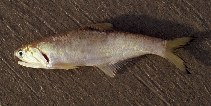| Family: |
Engraulidae (Anchovies), subfamily: Engraulinae |
| Max. size: |
30 cm TL (male/unsexed) |
| Environment: |
pelagic; freshwater; brackish |
| Distribution: |
South America: drainage (Orinoco, as far up as the Rio Manacacias in Colombia, rivers of the Guianas, and Amazon at least as far up as Teffe and the Jutahi River - if specimens were identified correctly - and even as far up as the Ucayali, Huallaga and Moroña Rivers of the upper Amazon). |
| Diagnosis: |
Dorsal spines (total): 0-0; Anal spines: 0-0; Anal soft rays: 26-30. Snout about 3/4 eye diameter, maxilla moderate, tip pointed, reaching almost to or just beyond front margin of pre-operculum. gill rakers short and stumpy. Dorsal fin origin well behind midpoint of body; anal fin origin below first to fourth branched dorsal fin rays. Silver stripe along flank, twice eye diameter at widest, lost in fishes over 10 to 12 cm SL; curve of black dots on operculum (Ref. 189). |
| Biology: |
Occurs far up rivers, but apparently reaches down to river mouths. Carnivorous, feeds on small fishes and probably crustaceans (Ref. 12225). A ripe female of 17.2 cm SL was recorded at Tucupita, Orinoco delta in Venezuela. |
| IUCN Red List Status: |
Least Concern (LC); Date assessed: 06 March 2017 Ref. (130435)
|
| Threat to humans: |
harmless |
Source and more info: www.fishbase.org. For personal, classroom, and other internal use only. Not for publication.

